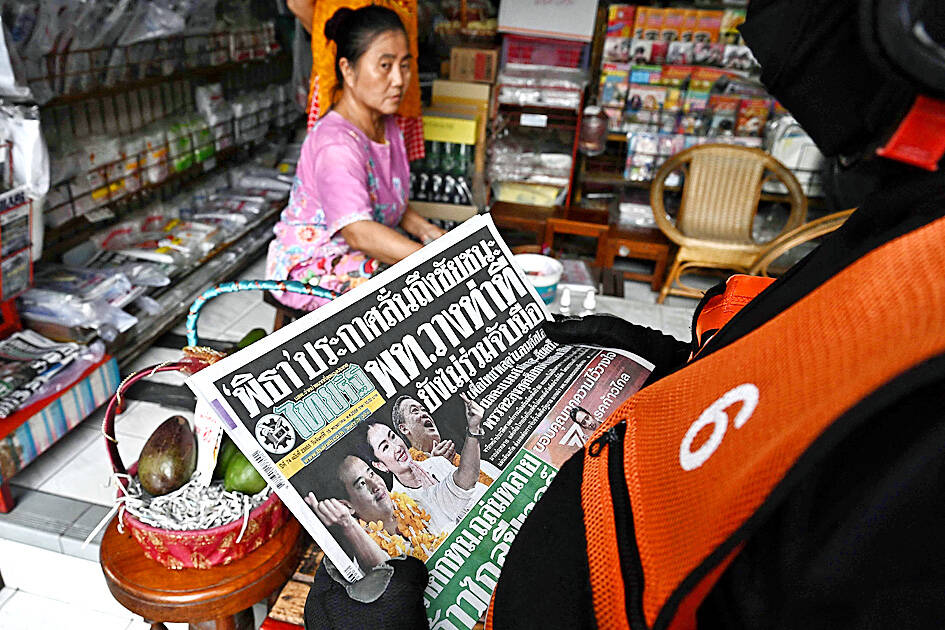Thailand’s economy expanded more than estimated in the first quarter as the nation benefited from a resurgence in tourism, although the outlook hinges on its ability to demonstrate political stability.
GDP grew 2.7 percent year-on-year in the three months to March, the Thai Office of the National Economic and Social Development Council (NESDC) said yesterday.
That is faster than the median 2.3 percent expansion estimated by economists in a Bloomberg survey. Output expanded 1.9 percent from the fourth quarter of last year.

Photo: AFP
While the return of tourists in the post-COVID-19-pandemic era supported first-quarter performance, the outlook depends on how smooth the transition of power is, after Sunday’s vote showed pro-democracy parties dominated the election.
With 99 percent of the votes counted, Move Forward Party and Pheu Thai Party were together projected to rack up 287 of the 500 seats in the lower house.
Even so, it is not yet clear whether the parties would be able to form a government even if early remarks from their leaders indicate a potential coalition.
In Thailand, 250 senators are appointed by the military who also get to vote for prime minister, along with the elected members of the lower house. That could determine whether the country would be politically stable, which is key to winning and keeping investor faith in the economy.
“I hope that after this election and we get a clear picture of politics and we get a clear picture of the economics numbers, the market would be more attractive,” Stock Exchange of Thailand president Pakorn Peetathawatchai said. “Once they see the recovery of all these industries, I’m quite certain that foreign funds will look at Thailand and see us as a more stable environment for investment.”
The baht advanced by the most in more than five weeks, climbing as much as 0.9 percent as election trends showed opposition parties were winning. The currency pared its gain to 0.5 percent, still keeping it among the top performers in emerging Asia this year.
Signs of an orderly formation of a new government appeared after Pheu Thai, which is linked to exiled former prime minister Thaksin Shinawatra, offered to support Move Forward’s leader, Pita Limjaroenrat, for prime minister. That follows earlier comments by Thailand’s army chief that there was “zero chance” of the Southeast Asian nation returning to a military rule in the event of post-election turmoil.
The NESDC maintained its forecast for tourist arrivals this year at 28 million.
Chinese travelers, who accounted for about 30 percent of visitors to Thailand before the pandemic, are returning again, with their numbers on course to hit 1 million a month starting in October.

KEEPING UP: The acquisition of a cleanroom in Taiwan would enable Micron to increase production in a market where demand continues to outpace supply, a Micron official said Micron Technology Inc has signed a letter of intent to buy a fabrication site in Taiwan from Powerchip Semiconductor Manufacturing Corp (力積電) for US$1.8 billion to expand its production of memory chips. Micron would take control of the P5 site in Miaoli County’s Tongluo Township (銅鑼) and plans to ramp up DRAM production in phases after the transaction closes in the second quarter, the company said in a statement on Saturday. The acquisition includes an existing 12 inch fab cleanroom of 27,871m2 and would further position Micron to address growing global demand for memory solutions, the company said. Micron expects the transaction to

Vincent Wei led fellow Singaporean farmers around an empty Malaysian plot, laying out plans for a greenhouse and rows of leafy vegetables. What he pitched was not just space for crops, but a lifeline for growers struggling to make ends meet in a city-state with high prices and little vacant land. The future agriculture hub is part of a joint special economic zone launched last year by the two neighbors, expected to cost US$123 million and produce 10,000 tonnes of fresh produce annually. It is attracting Singaporean farmers with promises of cheaper land, labor and energy just over the border.

US actor Matthew McConaughey has filed recordings of his image and voice with US patent authorities to protect them from unauthorized usage by artificial intelligence (AI) platforms, a representative said earlier this week. Several video clips and audio recordings were registered by the commercial arm of the Just Keep Livin’ Foundation, a non-profit created by the Oscar-winning actor and his wife, Camila, according to the US Patent and Trademark Office database. Many artists are increasingly concerned about the uncontrolled use of their image via generative AI since the rollout of ChatGPT and other AI-powered tools. Several US states have adopted

A proposed billionaires’ tax in California has ignited a political uproar in Silicon Valley, with tech titans threatening to leave the state while California Governor Gavin Newsom of the Democratic Party maneuvers to defeat a levy that he fears would lead to an exodus of wealth. A technology mecca, California has more billionaires than any other US state — a few hundred, by some estimates. About half its personal income tax revenue, a financial backbone in the nearly US$350 billion budget, comes from the top 1 percent of earners. A large healthcare union is attempting to place a proposal before